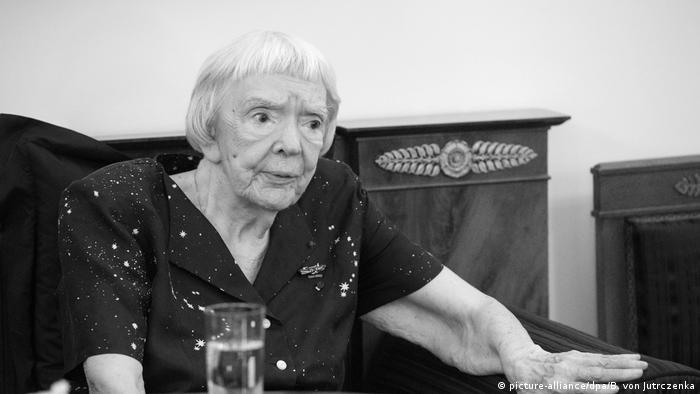Lyudmila Alexeyeva was head of the oldest Russian human rights organization, and winner of the Sakharov prize of the European Parliament. She died at the age of 91 years in Moscow.

Lyudmila Alexeyeva, a petite, gray-haired woman with a pageboy hairstyle, surrounded by Russian special forces, the shield of crowds and cameras. This was at a rally of the citizens ‘ movement strategy-31. This organized between 2009 and 2011, peaceful street protests to commemorate the paragraph 31 of the Russian Constitution, the right to Assembly and freedom of demonstration is guaranteed. But not always Alexeyeva was protected. 31. December 2010, the then 83-Year-old appeared at a Demonstration in the center of Moscow in a costume of the snow girl Snegurochka, a Russian fairy-tale character. She was arrested and taken to a police bus pulled up.
In discussions with the DW, she was often asked if she was disappointed due to the restriction of civil rights in Russia. To do this, you said: “As bad as it is though, the human rights, so it looks better today than it was in the Soviet Union, when we had no rights at all.” Alexeyeva was happy that she was able to experience how Russia got the beginning of the 1990s, a democratic Constitution and a solid legal base, which allows it to demand the observance of human rights. About today’s setbacks, she said: “We have not fought for this freedom. But now we have to fight for us slowly and painfully.” At the same time, she rejected the slogan “Russia without Putin,” out of respect for those who have chosen the present Russian President.
Committed to gratitude

Russian media chose Alexeyeva is one of the most influential people in the country
Respect to her was missing but, apparently, many of their opponents. In Russian television the Alexeyeva-led the Moscow Helsinki group, the oldest human rights organization in Russia, but also to you personally again and again, the Connections to foreign accused intelligence services. As was shown in a TV programme, a copy of your U.S. passport, as proof of their alleged disloyalty to Russia.
In 1982 Alekseeva acquired in fact, the US citizenship. They had emigrated in 1977 in the USA, because you are threatened in the Soviet Union, the arrest. There, she had supported political prisoners in prison camps and detention centers visited, but also literature distributed, which was banned by the Soviet authorities. In 1976, she joined the Moscow Helsinki group, the information about people gained rights violations in the Soviet Union, for example, be instructions of opponents of the regime Coercion in psychiatry. A year earlier, Moscow had signed the Helsinki final act of the conference for security and cooperation in Europe (CSCE), the forerunner of today’s OSCE. Thus, the Soviet Union committed itself to respect human rights. Hence the Name of the group. It consisted of six years. In that time, eight members were sentenced to imprisonment or exile, sentenced, six – including Lyudmila Alexeyeva – had to emigrate.
In the United States Alexeyeva was able to live free and work. There, the historian published a book on the dissident movement in the Soviet Union. Out of gratitude for this freedom you want to give up their US citizenship, never, in spite of all the accusations against you because of your U.S. passport. Grateful, she was also the first and last Soviet President Mikhail Gorbachev, during his term of office, and with his help, the Communist Regime collapsed. In 1993, Alekseyeva returned to Russia and received Russian citizenship.
The call a spade a spade

They protested against Putin. Nevertheless, he signed Alexeyeva 2017
In may 1996, Alexeyeva took over the management of the Moscow Helsinki group – up to her death. In the post-Soviet Russia, they dealt initially with the processing of the totalitarian past of the country. But the first war in Chechnya that erupted in 1994, under the President Boris Yeltsin, was for you, and other human rights activists to the test. Bitterly criticized Alexeyeva the disproportionate use of force by the Russian army, the deployment of a conscript and the of the parties to the conflict committed war crimes. When Yeltsin died in April 2007, said Alexeyeva of the DW in connection with the two Wars in Chechnya: “Yeltsin was a large personality, and great his error.”
To put times, as non-governmental organizations in Russia, nor financial resources from abroad were able to get to without a as a “foreign Agent” branded, the Moscow Helsinki group, many of the projects: observation of elections, the fight against police arbitrariness and the defence of the rights of migrants. However, in recent years, many projects had to be set. Without offending, called Alekseeva things. You described the crime as a crime and villainy than villainy. “I say what I think is necessary,” she said in a recent interview for the DW. A pity that this voice, the voice of the conscience of Russia, is now silent.